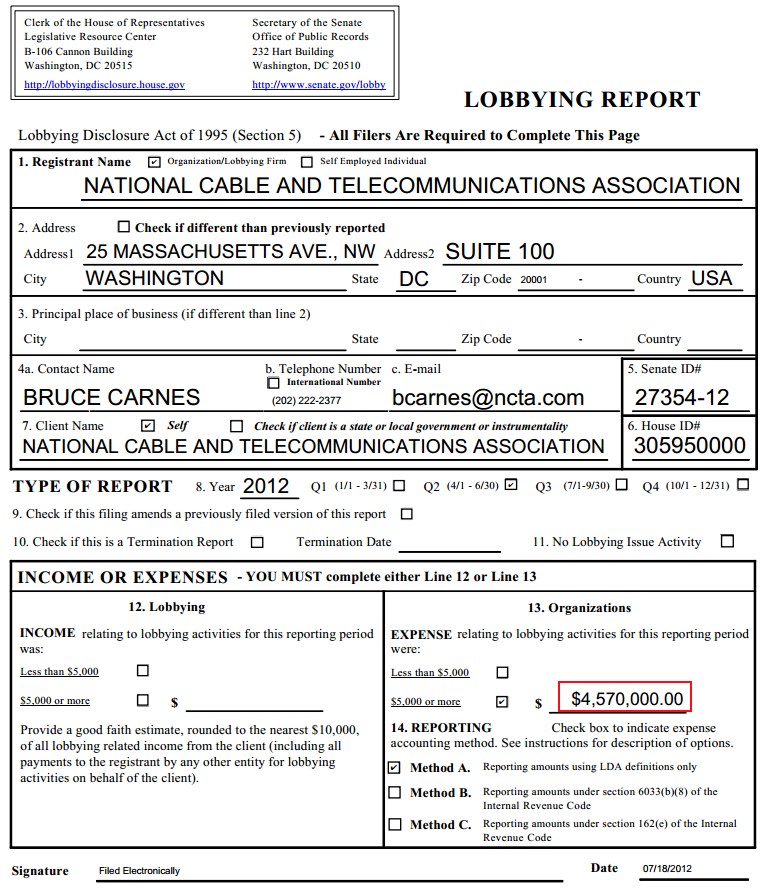Susan Crawford points us to this fun fact: While the cable industry wants to raise your prices to cover increased costs, one of the things they forgot to mention is more than $8,900,000 (so far this year) of your money was shipped straight to Washington to hand out to lawmakers. In the last quarter alone, the National Cable & Telecommunications Association has spent more than $4.5 million lobbying Washington on everything from repealing the Dodd-Frank Wall Street Reform and Consumer Protection Act to the Internet Freedom Act. If consumers are for it, the NCTA is against it. The ironic part of it is they put your money to work against your interests.
Imagine what you could do with $8.9 million — bringing broadband to the unserved, making service better for those who already have it, and keeping your broadband bill in check. Just sayin’.


 Subscribe
Subscribe

Lemme get this straight: when you pay your monthly cable bill, the money is STILL yours, even though you have “consumed” the cable service for a month that you just paid for?
Is that what you mean by “your” money?
Your cable bill is $85. Let’s say $80 of that went to pay for the cable service and another five of your hard-earned bills didn’t actually pay for the “increased programming costs” and other excuses the industry hands you whenever your bill goes up. It went straight into a lobbyist’s checking account to dole out to bought and paid for elected officials. The industry complains about the costs of doing business (which aren’t as horrific as they make you believe when you read their balance sheets) and then throw nearly $9 million down a rathole in DC. That nine million… Read more »
Phillip: I don’t know what you do when you’re not running this website, but let me assume you for the sake of argument that you are a business owner. You sell a product or service of some kind. Once a buyer uses whatever product or service you sold them, they pay you for it. And once they pay you for it, what was “their” money now becomes YOURS, to do with as you see fit. They paid you for something; if they didn’t see the value in it or thought it was overpriced, they would not have agreed to the… Read more »
The telecommunications marketplace is, by the design of intense lobbying, barely competitive. With services like broadband now becoming a utility service, consumers have every right to assert the slush funding of corporate lobbying campaigns with their subscriber dollars is unacceptable, especially when that money is used to lobby to keep the anti-competitive status quo. Cable rates go up, lobbying spending goes up, consumer choice goes down. When you need a product or service and do not have much of a choice for it, you can’t simply walk away because you think it is overpriced. Once a service becomes a practical… Read more »
So what is the solution?
As we managed to achieve in 1992 with pro-consumer reforms that promulgated the development of satellite-delivered television competition: a new law and/or regulatory reform that guarantees access to broadband networks at fair wholesale rates by third party competitors who can market competitive service, policies that encourage and support new entrants into a lightly regulated marketplace, guarantees of unimpeded community-owned broadband development, rural broadband subsidies for development of rural Internet solutions including WISPs, rural fiber/DSL, etc., and a regulatory framework that defines broadband as a telecommunications service, giving regulators a clearly defined role in its development, oversight and operation when a… Read more »
OK maybe I misunderstood the point of your original post.
You just posed a “solution” that addresses the lack of competition in the broadband last-mile market, but every one of those competitors could still spend a ton of their money on lobbying, which is the problem I THOUGHT we were talking about, and which was the topic of your original post.
Thanx